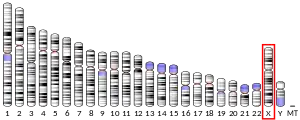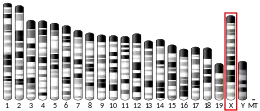TAF7L
TATA-box binding protein associated factor 7 like is a protein that in humans is encoded by the TAF7L gene. [5]
Function
This gene is similar to a mouse gene that encodes a TATA box binding protein-associated factor, and shows testis-specific expression. The encoded protein could be a spermatogenesis-specific component of the DNA-binding general transcription factor complex TFIID. Alternatively spliced transcript variants encoding different isoforms have been found for this gene. [provided by RefSeq, Dec 2009].
References
- GRCh38: Ensembl release 89: ENSG00000102387 - Ensembl, May 2017
- GRCm38: Ensembl release 89: ENSMUSG00000009596 - Ensembl, May 2017
- "Human PubMed Reference:". National Center for Biotechnology Information, U.S. National Library of Medicine.
- "Mouse PubMed Reference:". National Center for Biotechnology Information, U.S. National Library of Medicine.
- "Entrez Gene: TATA-box binding protein associated factor 7 like". Retrieved 2018-03-03.
Further reading
- Stouffs K, Willems A, Lissens W, Tournaye H, Van Steirteghem A, Liebaers I (April 2006). "The role of the testis-specific gene hTAF7L in the aetiology of male infertility". Mol. Hum. Reprod. 12 (4): 263–7. doi:10.1093/molehr/gal020. PMID 16597641.
- Akinloye O, Gromoll J, Callies C, Nieschlag E, Simoni M (October 2007). "Mutation analysis of the X-chromosome linked, testis-specific TAF7L gene in spermatogenic failure". Andrologia. 39 (5): 190–5. doi:10.1111/j.1439-0272.2007.00789.x. PMID 17714218. S2CID 13317343.
- Yazarloo F, Shirkoohi R, Mobasheri MB, Emami A, Modarressi MH (March 2013). "Expression analysis of four testis-specific genes AURKC, OIP5, PIWIL2 and TAF7L in acute myeloid leukemia: a gender-dependent expression pattern". Med. Oncol. 30 (1): 368. doi:10.1007/s12032-012-0368-8. PMID 23292864. S2CID 20377221.
- Oh HR, An CH, Yoo NJ, Lee SH (July 2015). "Frameshift mutations of TAF7L gene, a core component for transcription by RNA polymerase II, in colorectal cancers". Pathol. Oncol. Res. 21 (3): 849–50. doi:10.1007/s12253-014-9832-4. PMID 25098277. S2CID 15595245.
This article incorporates text from the United States National Library of Medicine, which is in the public domain.
This article is issued from Wikipedia. The text is licensed under Creative Commons - Attribution - Sharealike. Additional terms may apply for the media files.



